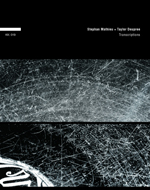|
|
 |
Dusted Reviews
Artist: Stephan Mathieu + Taylor Deupree Album: Transcriptions Label: Spekk Review date: Aug. 26, 2009 |

|
|
|
 |
The greatest gifts can become creative cul-de-sacs. On Radioland, The Sad Mac, and Hidden Name, Stephan Mathieu got so good at processing diverse materials into a golden aura of gorgeous sound that the appearance of a new record raises the question; is he just going to make some more pretty music? His self-aware struggle with this issue informs Transcription.
The record started out in 2007 as a solo project that Mathieu intended to give to Taylor Deupree’s 12k label. Perhaps as an antidote to his tendency to work with digital signal processors, he’d begun collecting wax cylinders 78 rpm records, and he began playing them back through a maze of software patches and microphone pathways. While the source material is mainly classical recordings committed to easily degraded media nearly a century ago, it’s hard to hear much of the original music, or even the accompanying crackle. Between the digital gloss and the breakdown that occurs when you play a sound into a room, record it, and do it again several times, Mathieu has once more attained an acme of delicate beauty. After he’s done his work, surface noise is a diaphanous spray and a once-robust orchestra is a nearly invisible ghost. By comparison the music of that other poetic reframer of old records, Philip Jeck, sounds as coarse as the Stooges, his use of recognizable material as blatant as Vanilla Ice’s.
At a certain point, recognizing that the music was “rather demure” but loath to muss it up, Mathieu sent it to Deupree, and a solo album became a collaboration. Since the American multi-instrumentalist (he plays guitars and synthesizers here) is no stranger to processing, it’s not always easy to tell Deupree’s work from Mathieu’s. But on a track like “Remain,” where it’s relatively easy to separate the electronic oscillations from the blessed-out crackle, it’s evident that he’s added some presence, or at least put a sheet on the ghost so you can find it. This is still a light and airy recording, not at all the sort of thing you’d play to get pumped and primed for action. But by passing the music from one set of hands to another, Mathieu added some necessary heft.
By Bill Meyer
|







